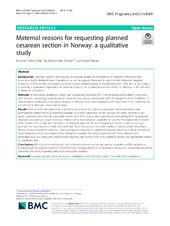| dc.contributor.author | Eide, Kristiane Tislevoll | en_US |
| dc.contributor.author | Morken, Nils-Halvdan | en_US |
| dc.contributor.author | Bærøe, Kristine | en_US |
| dc.date.accessioned | 2020-08-11T13:30:21Z | |
| dc.date.available | 2020-08-11T13:30:21Z | |
| dc.date.issued | 2019 | |
| dc.Published | Eide KT, Morken N, Bærøe K. Maternal reasons for requesting planned cesarean section in Norway: A qualitative study. BMC Pregnancy and Childbirth. 2019;19:102 | eng |
| dc.identifier.issn | 1471-2393 | |
| dc.identifier.uri | https://hdl.handle.net/1956/23662 | |
| dc.description.abstract | Background: Pregnant women who request a cesarean section in the absence of obstetric indication have become a highly debated issue in academic as well as popular literature. In order to find adequate, targeted treatment and preventive strategies, we need a better understanding of this phenomenon. The aim of this study is to provide a qualitative exploration of maternal requests for a planned cesarean section in Norway, in the absence of obstetric indications. Methods: A descriptive qualitative study was conducted consisting of 17 semi-structured, in-depth interviews with women requesting cesarean section and six focus group discussions with 20 caregivers (nine midwives, 11 obstetricians) working at a university hospital in Norway. Data were analyzed with Systematic Text Condensation, a method for thematic cross-case analysis. Results: Fear of birth emerged most commonly as a result of a previous traumatic birth experience that prompted a preference for a planned cesarean to avoid a repetition of the trauma. For some women in our study, postnatal care and the puerperal period were their crucial past experiences, and giving birth by planned cesarean was seen as a way to ensure mental rather than physical capability to care for the expected child after birth. Others were under the impression of being at high risk for an emergency C-section, and requesting a planned one was based on their perceived risk. Such perceptions included having a narrow pelvis, hereditary factors or previous birth outcomes. Some primiparas requested a planned cesarean based on a deep-seated fear since their early teens, accompanied by alienation towards the idea of giving birth. Some obstetricians participating in our study also experienced requests that lacked what they regarded as any well-grounded reason or significant fear. Conclusions: Behind a maternal request for a planned cesarean section are various rationales and life experiences needing carefully targeted attention and health care. Previous births are an important driver; thus, maternally requested cesareans should be regarded partly as an iatrogenic problem. | en_US |
| dc.language.iso | eng | eng |
| dc.publisher | BioMed Central | eng |
| dc.rights | Attribution CC BY | eng |
| dc.rights.uri | http://creativecommons.org/licenses/by/4.0 | eng |
| dc.title | Maternal reasons for requesting planned cesarean section in Norway: A qualitative study | en_US |
| dc.type | Peer reviewed | |
| dc.type | Journal article | |
| dc.date.updated | 2020-01-31T22:27:36Z | |
| dc.description.version | publishedVersion | en_US |
| dc.rights.holder | Copyright 2019 The Author(s) | |
| dc.identifier.doi | https://doi.org/10.1186/s12884-019-2250-6 | |
| dc.identifier.cristin | 1710167 | |
| dc.source.journal | BMC Pregnancy and Childbirth | |

